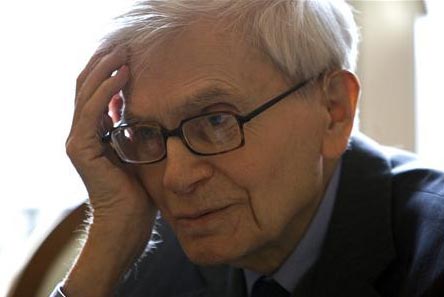French ‘Spiritualist’ Awarded Prestigious Templeton Prize
By Tom Heneghan | Мар 28, 2009

PARIS (Reuters) – French physicist and philosopher Bernard d’Espagnat has won the 2009 Templeton Prize, billed as the world’s largest annual award to an individual, for his work affirming the spiritual dimension of life.
The Templeton Foundation announced the $1.42 million prize at the United Nations Educational, Scientific and Cultural Organization (UNESCO) in Paris on Monday.
Award organizers said his work in quantum physics revealed a reality beyond science that spirituality and art could help to partly grasp.
John Templeton Jr, president of the foundation launched by his late father, said at the ceremony that d’Espagnat, 87, had “explored the unlimited, the openings that new scientific discoveries offer in pure knowledge and in questions that go to the very heart of our existence and humanity.”
Previous winners include Russian writer Alexander Solzhenitsyn, United States evangelist Billy Graham and Albanian-born Mother Teresa.
D’Espagnat, a former senior physicist at the CERN particle physics laboratory in Geneva and professor at French and United States universities, argues in his books that modern quantum physics shows that ultimate reality cannot be described.
Classical physics developed by Isaac Newton believes it can describe the world through laws of nature that it knows or will discover. But quantum physics shows that tiny particles defy this logic and can act in indeterminate ways.
D’Espagnat says this points toward a reality beyond the reach of empirical science. The human intuitions in art, music and spirituality can bring us closer to this ultimate reality, but it is so mysterious we cannot know or even imagine it.
“Mystery is not something negative that has to be eliminated,” he said. “On the contrary, it is one of the constitutive elements of being.”
ON PHYSICS AND PHILOSOPHY
In an interview on Friday, d’Espagnat told Reuters he was brought up a Roman Catholic but did not practice any religion and considered himself a spiritualist.
Some baffling discoveries of quantum physics led him to believe all creation has a wholeness and interrelatedness that many scientists miss by trying to break problems down into their component parts rather than understand them in larger contexts.
One of these is entanglement, the way that paired subatomic particles remain linked even if they move far apart, so that experimenting with one automatically effects the other without any apparent communication between them.
This view clashes with the materialist outlook widespread among scientists.
“Materialists consider that we are explained entirely by combinations of small uninteresting things like atoms or quarks,” said d’Espagnat, whose latest book in English — “On Physics and Philosophy” — was published in 2006.
“I believe we ultimately come from a superior entity to which awe and respect is due and which we shouldn’t try to approach by trying to conceptualize too much,” he said. “It’s more a question of feeling.”
Although they cannot be tested, the intuitions people have when they are moved by great art or by spiritual beliefs help them grasp a bit more of ultimate reality, d’Espagnat said.
“When they hear very good music, people who like classical music have the impression they get at some reality that way. Why not?” he asked.















